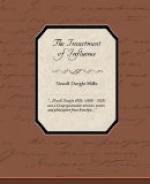History permits no man to escape the reflection that if, for the time being, individuals have escaped this moral law, nations have felt its full force. Nature does, indeed, walk through the fields with footsteps so gentle as to disturb no drop of dew hanging upon the blade of grass. Nature also hath her sterner aspect, and for the sons of iniquity her footsteps are earthquakes, her strokes are strokes of war and of pestilence. When Sophocles worked out the law of moral retribution for King Oedipus and Antigone, his daughter, the poet might well have gone on to note that if the Grecian army had sacked the Trojan cities the time would come when the Roman fleet would sack her cities and make her sons to toil as captives. Later on, if the Roman conquerors swept the East for corn and wheat, looted stores and shops, pillaged palaces for treasure for triumphal processions, the time came when Nature and God decreed that the vast wealth piled up in the Roman capital should excite the cupidity of the Goths, until at last the streets of that great city were swept with flame and store-houses were pillaged by marauders. In reviewing the history of Venice Ruskin was so impressed with this principle of the moral harvest that he affirms that the history of palace and cathedral, of fleets and navies, is simply the story, written by a pen dipped in fire and blood, of how the children reaped what the fathers had sown.
For many months past the statesmen of England have been sending forth discussions reviewing the career of their country. In the light of the Eastern problem one of these authors reflects that whenever England has sown injustice to a weaker nation she has reaped injustice and retribution for herself. He notes that in the last century the governors of England—for example, Lord Hastings—went through the land robbing rajahs, despoiling the people by false weights and measures, until they had turned the whole country into one vast desert. The hour came when before the House of Commons Burke impeached Hastings for high crimes and misdemeanors, as the enemy of India and England and all men. But England was content to impose a trifling fine upon her wicked official. How could she give up the treasure she had filched for herself? Years passed and an injured people brooded upon its wrongs, and the time came when what England had sown in tears she reaped in blood. One day the Indian soldiers mutinied. The next day the wells were filled with the bodies




